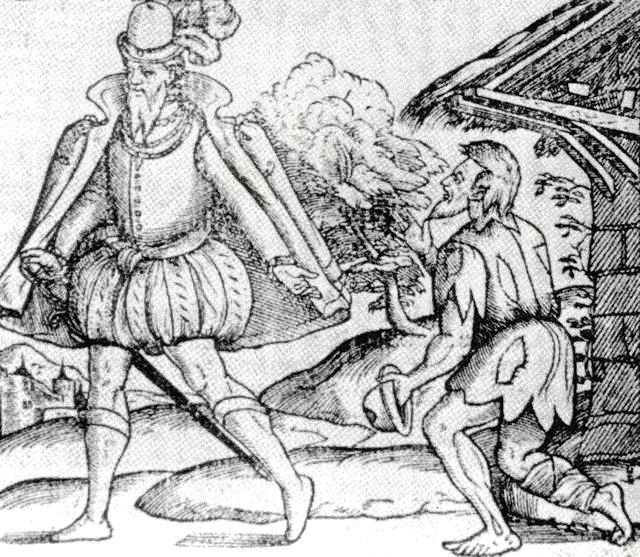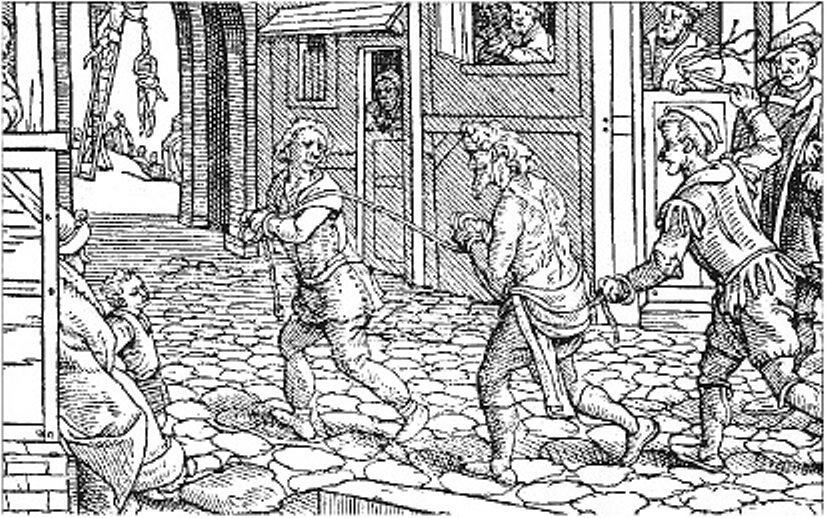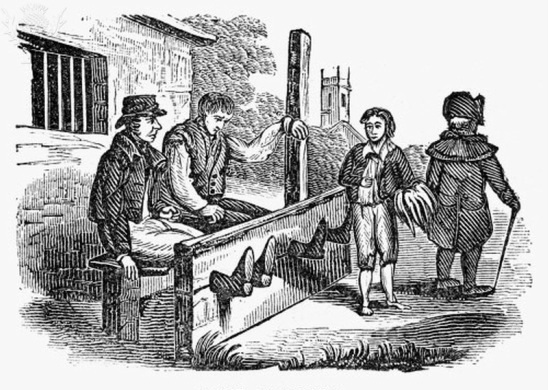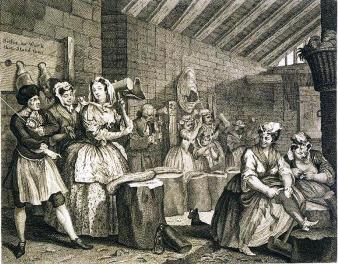 From the time of the Black Death in the 1340s through to the 17th century, the roads of England were crowded with people
who had lost their former employment through a variety of causes, had no means of livelihood and had taken to a vagrant life.
From the time of the Black Death in the 1340s through to the 17th century, the roads of England were crowded with people
who had lost their former employment through a variety of causes, had no means of livelihood and had taken to a vagrant life.
There were a number of causes for this, not least the gradual decay of the feudal system under which the labouring classes
had been anchored to the soil, and substantial increases in population. The situation was worsened by a series of poor
harvests, and the dissolution of the monasteries in the 1530s. The latter had previously administered a kind of “public assistance”
in the form of lodging, food and alms.
The authorities were fearful of the threat to public order posed by large numbers of unemployed and destitute people, and they
responded with a number of penal laws. These were aimed primarily at "sturdy beggars" (the able bodied unemployed), who were
regularly punished in the stocks.
There have been a large number of these "Poor Laws" over the centuries. Here are a few examples:
The Statute of Labourers 1349
Arguably the first piece of employment law in England, this was the first formal enactment
to discourage begging. It also attempted to regulate the labour market in the aftermath of the Black Death. The law confined servants
to the particular locality where they lived the winter before, if there was work in that town. "[N]one of them go out of the town,
where he dwelleth in the winter, to serve the summer, if he may serve in the same town". The punishment was a minimum of three days
in the stocks.
The Statute of Cambridge 1388
This followed a clamp down by the authorities during the aftermath of the Peasants' Revolt of 1381. The Statute distinguished
between "impotent beggars" (those incapacitated by age or infirmity) and "sturdy beggars", who were capable of work and deserved
to be punished for idleness.

The Vagabonds and Beggars Act 1494
This provided that “vagabonds, idle and suspected persons shall be set in the stocks for three days and three nights and have none
other sustenance but bread and water and then shall be put out of Town. Every beggar suitable to work shall resort to the Hundred
where he last dwelled, is best known, or was born and there remain upon the pain aforesaid.” The Act does not define "suspected
persons", but this was likely to be any stranger who could not demonstrate that he or she possessed adequate funds.
The Poor Law Act 1531
This tightened the law further. It directed “how aged, poor, and impotent Persons, compelled to live by Alms, shall be ordered; and
how Vagabonds and Beggars shall be punished. The former were to be licensed to beg; the latter if found begging were to be whipped
or put in the stocks for three days and nights with bread and water only and then to return to their birth-place and put to labour”.
Even the aged and infirm were put in the stocks for two days and nights if they were found begging somewhere where they had not been
authorised.
The Vagrancy Act 1547
 This stated that any able-bodied person who was out of work for more than three days should be branded with a V (for "Vagrant") and sold
into slavery for two years. Any further offences would result in slavery for life. This was considered harsh even by 16th century standards
and many local authorities refused to enforce this legislation.
This stated that any able-bodied person who was out of work for more than three days should be branded with a V (for "Vagrant") and sold
into slavery for two years. Any further offences would result in slavery for life. This was considered harsh even by 16th century standards
and many local authorities refused to enforce this legislation.
The Poor Law Act 1576
This authorised counties to establish "houses of correction" (also known as a Bridewell) for vagrants, but these were confined to the larger cities.
The stocks remained the standard punishment for unauthorised begging in most of the country.
The Rogues, Vagabonds, and other Idle and Disorderly Persons Act 1744
 This prescribed punishment of up to one month in a “house of correction” for those who lived idly and refused work or begged alms. A reward
of five shillings could be paid to any person apprehending an offender.
This prescribed punishment of up to one month in a “house of correction” for those who lived idly and refused work or begged alms. A reward
of five shillings could be paid to any person apprehending an offender.
Although a stay in a “house of correction” might seem preferable to three days in the stocks, this was no easy alternative. Almost all the
prisoners were put to hard labour, typically beating hemp. And over half of the inmates were whipped, particularly those deemed guilty of
theft, vagrancy, and nightwalking (prostitution).
The Poor Law Amendment Act 1834
This required each parish to establish a workhouse for the destitute, including the able bodied unemployed. Although some of these were
relatively enlightened by the standards of the day, most were grim and unpleasant places. Some were little better than the aforementioned
"houses of correction", although inmates could leave the workhouse if they wished. Food was basic, the work regime was harsh, and families
were separated from each other.
The workhouse system continued until 1930, and was subsequently replaced with the benefits system we enjoy today. A far cry from the days when
"sturdy beggars" were put in the stocks.

 From the time of the Black Death in the 1340s through to the 17th century, the roads of England were crowded with people
who had lost their former employment through a variety of causes, had no means of livelihood and had taken to a vagrant life.
From the time of the Black Death in the 1340s through to the 17th century, the roads of England were crowded with people
who had lost their former employment through a variety of causes, had no means of livelihood and had taken to a vagrant life.

 This stated that any able-bodied person who was out of work for more than three days should be branded with a V (for "Vagrant") and sold
into slavery for two years. Any further offences would result in slavery for life. This was considered harsh even by 16th century standards
and many local authorities refused to enforce this legislation.
This stated that any able-bodied person who was out of work for more than three days should be branded with a V (for "Vagrant") and sold
into slavery for two years. Any further offences would result in slavery for life. This was considered harsh even by 16th century standards
and many local authorities refused to enforce this legislation.
 This prescribed punishment of up to one month in a “house of correction” for those who lived idly and refused work or begged alms. A reward
of five shillings could be paid to any person apprehending an offender.
This prescribed punishment of up to one month in a “house of correction” for those who lived idly and refused work or begged alms. A reward
of five shillings could be paid to any person apprehending an offender.
